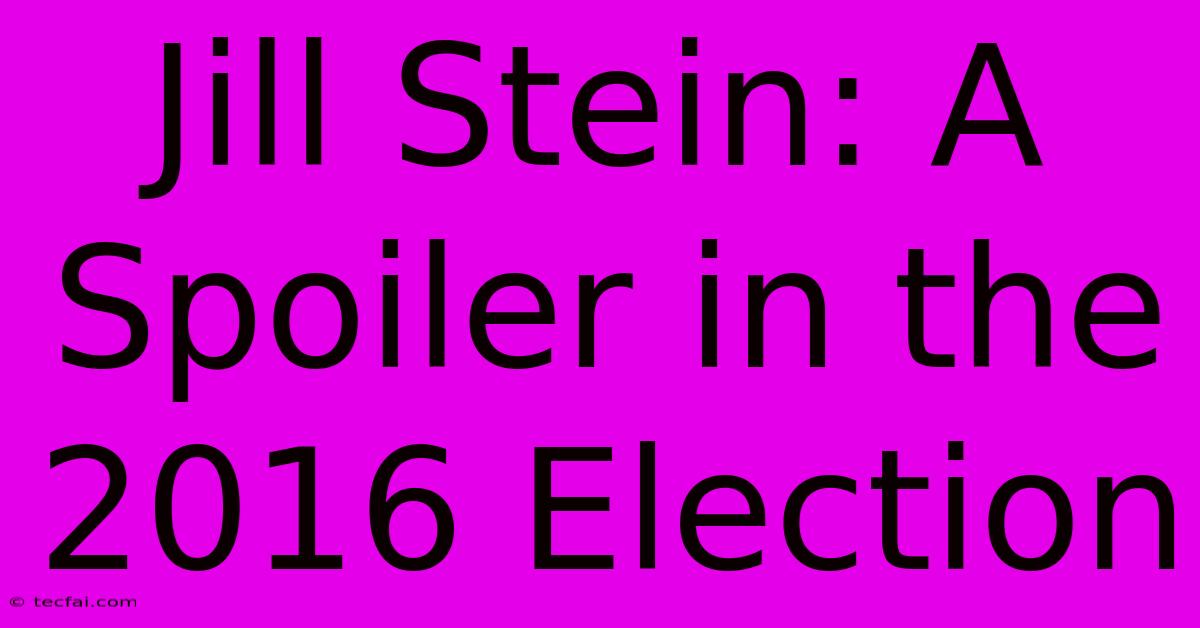Jill Stein: A Spoiler In The 2016 Election

Discover more detailed and exciting information on our website. Click the link below to start your adventure: Visit Best Website tecfai.com. Don't miss out!
Table of Contents
Jill Stein: A Spoiler in the 2016 Election?
The 2016 US presidential election was a closely contested race, with many factors contributing to the outcome. One controversial element was the role of third-party candidates, particularly Jill Stein, the Green Party nominee. While Stein garnered a relatively small percentage of the popular vote, her presence in the race became a focal point for debate, with some accusing her of playing the role of a "spoiler" and impacting the result.
The "Spoiler" Argument:
The "spoiler" argument posits that Stein's candidacy drew votes away from Hillary Clinton, the Democratic nominee, particularly in key swing states like Michigan, Pennsylvania, and Wisconsin. These states ultimately went to Donald Trump, the Republican nominee, by narrow margins. Supporters of this view believe that had Stein not been in the race, Clinton may have received enough votes to win the Electoral College and the presidency.
Arguments in favor of this view include:
- Similar voter demographics: Stein's supporters shared overlapping demographics with Clinton's, suggesting that many voters who supported Stein may have voted for Clinton in her absence.
- Close margins in swing states: The very narrow victory margins in key states highlighted the potential impact of even small shifts in the vote.
- Post-election analysis: Some post-election analysis suggested that Stein's vote total in specific counties in swing states was significant enough to have potentially tipped the balance in Trump's favor.
Counterarguments:
Opponents of the "spoiler" argument counter that Stein's candidacy had negligible impact on the outcome. They argue that:
- Trump's victory was driven by larger factors: The election was influenced by factors like economic anxieties, anti-establishment sentiment, and racial tensions, not simply the presence of a third-party candidate.
- Stein voters wouldn't have necessarily supported Clinton: Some argue that Stein's supporters were ideologically opposed to Clinton and would not have voted for her regardless.
- The "spoiler" argument ignores the potential impact of other factors: For example, voter suppression efforts and the influence of Russian interference might have played a larger role in the outcome.
The Bigger Picture:
While the debate surrounding Stein's role in the election continues, it is important to acknowledge the larger context. The 2016 election exposed a deep divide in American society, with many voters feeling disillusioned with the two-party system. This disillusionment fueled the rise of third-party candidates like Stein, who offered an alternative to the established political order.
Ultimately, whether Stein's candidacy had a significant impact on the outcome is a matter of debate and speculation. However, it is clear that her presence in the race was a symptom of a larger trend of voter dissatisfaction and frustration with the status quo.
The Aftermath:
The 2016 election brought renewed attention to the role of third-party candidates in American politics. While their impact on individual elections may be debated, they often serve as a platform for raising important issues and highlighting voter dissatisfaction with the current political landscape. Whether Stein's candidacy can be definitively labeled a "spoiler" remains a matter of ongoing debate. However, her presence in the race sparked crucial conversations about the future of American democracy and the need for greater representation and political choice.

Thank you for visiting our website wich cover about Jill Stein: A Spoiler In The 2016 Election . We hope the information provided has been useful to you. Feel free to contact us if you have any questions or need further assistance. See you next time and dont miss to bookmark.
Featured Posts
-
Monkeypox Clade Ib Cases Confirmed In Uk
Nov 06, 2024
-
Aps Method For Calling Elections
Nov 06, 2024
-
Uefa Youth League Sporting Cp Wins Over 10 Man City
Nov 06, 2024
-
Why Donald Trump Can Still Vote In 2024
Nov 06, 2024
-
Trumps Impact Blue Wall Crumbles
Nov 06, 2024
